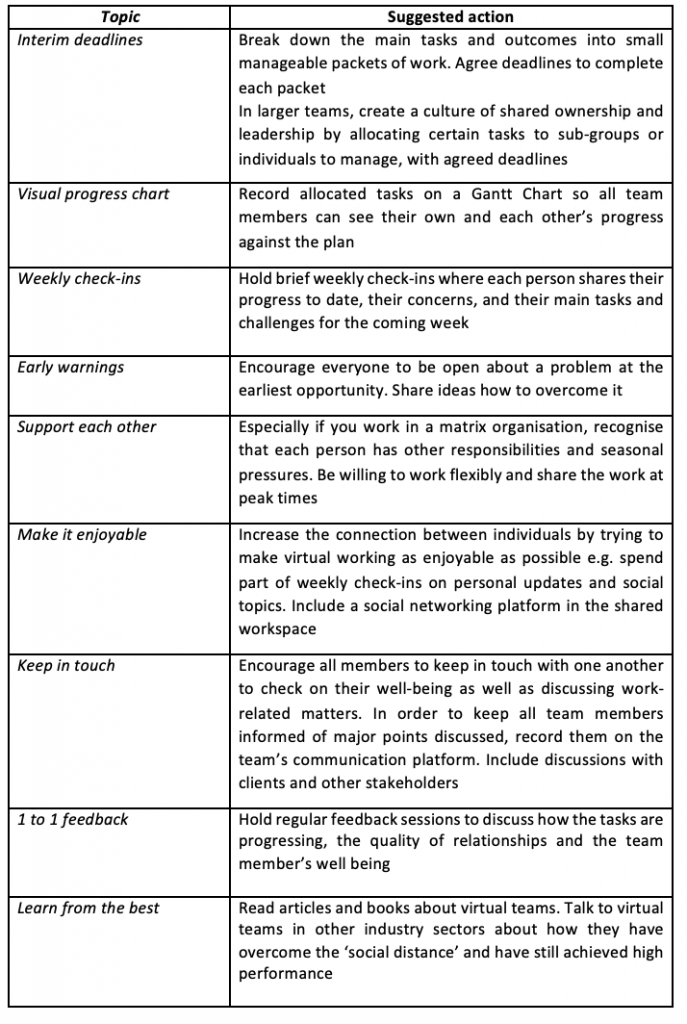Part-time virtual working is common. But overnight, in many countries, full-time virtual working for all employees became mandatory leaving no time for planning or specialised training, says Richard Fox
The ‘office in your pocket’, together with a modern communication platform provide essential aids to team members who have been thrust into an unexpected environment of home working, but technology by itself is not the answer to the challenges of working virtually. To build better relationships human engagement is the top priority.
The foundation of all working relationships
Before we look at the special features of virtual working let’s remind ourselves that a strong foundation is needed in any working relationship. You may have come across sayings like ‘People prefer to work with people they like’ or ‘People buy people first and products and services second’. To equip yourself for effective relationships you need to invest time in:
- Building and maintaining rapport, credibility and trust
- Learning to listen attentively and, where relevant, empathically
- Expressing yourself clearly
When there is a problem in a team, it is likely to be caused by a weak foundation. Please bear this in mind as you read on.
The following paragraphs give tips on how to build and maintain better relationships when working virtually. Although I have assumed that you are mainly interested in virtual teams, the following paragraphs can be adapted easily to cover other types of virtual working e.g. specialists networking in a community of best practice.
Revisit the team’s plans. If the team has recently become a virtual team the team needs to adapt and reconfirm its plans. Topics to agree include restating the team’s shared purpose and vision; the team’s required outcomes; its measures of success; and who does what and by when. Revisit these topics regularly to help ensure each person’s efforts are aligned to the team’s purpose and vision.
Working virtually requires a new mind-set, together with new behaviours and processes. The new mind-set recognises that it’s all about relationships. Virtual working throws up new challenges e.g. trying to contact a colleague when you need help or a quick decision; in handling disagreements; or getting to grips with a new communication platform. Providing prompt support helps to strengthen working relationships.
Communication. The team should spend time agreeing a communication protocol. Typically, this involves listing the main activities requiring communication and against each one noting the form that the communication should take. We are all aware of the misunderstandings, annoyance and wasted time that some emails and text messages can cause. Therefore, only use them for specific types of communication e.g. to confirm arrangements or a decision.
All members of the team should spend substantially more time communicating with each other. During virtual meetings build in time for social chit chat. ‘People persons’ will immediately see the relevance of this, whilst team members who are primarily task-focussed may need to learn the importance of ‘small talk’ and patience.
Maintain momentum. In a virtual team the risk of losing momentum is higher than in a traditional team. For example, a manger in a dispersed team will find it more difficult to check on progress and quality of work. In addition, the manager will not be available for the kinds of quick and informal conversations that face to face contact make easy and which serve to maintain focus, encouragement, support and motivation. To counter this the manager could discuss and agree the following actions:

Manage conflict
In any team conflict is likely. As this danger can be more prominent in virtual team working it is important to find ways to encourage team members to ‘speak up’ and express their opinions. Even in this difficult period in our history endeavour to have a light touch. Remember ‘a smile is a curved line that makes things straight’.
Maintain team bonding. A long spell of working virtually can create a feeling of loneliness, being left out, abandoned or forgotten, resulting in stress, health issues and lower productivity. Some team members will find full-time virtual working particularly difficult and their manager should endeavour to meet their preferred ways of working. For example, an extrovert team member (as defined by Myers Briggs Personality Types) is energised by social interaction with people within and outside their organisation.
Utilise existing skills and tools. Although virtual working is significantly different than traditional face to face team working, continue to use other skills and tools you have learned e.g. project management skills, how to delegate effectively, influencing with integrity and Bruce Tuckman’s stages of team development. All these skills help to build and maintain good relationships.
Conclusion
If you only take away one thing from this article about building better relationships it is to increase the volume and quality of communication, especially listening.
Richard Fox is founder of pan-European firm The Learning Corporation and author of new book Making Relationships Work at Work – a toolkit for getting more done with less stress available June.



